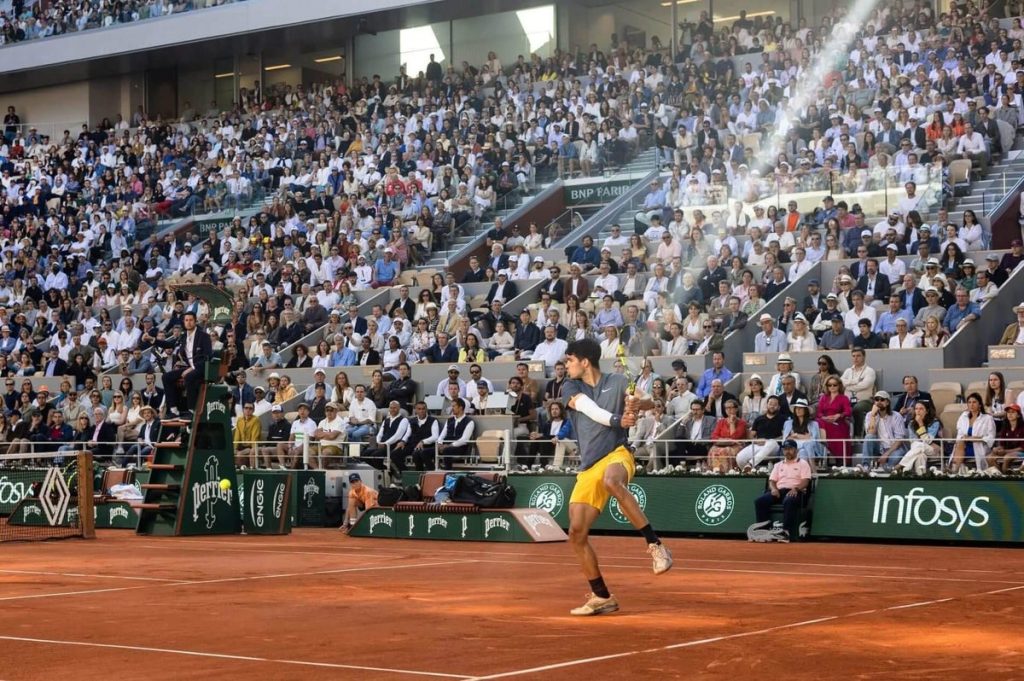The newest addition to the tennis documentary category features Carlos Alcaraz, one of the two male players expected to dominate the sport in the coming decade. The series delves into the uncertainties surrounding his future.
Will he achieve it? Could he become the greatest player of all time? Is he prepared to make the necessary sacrifices? Can he succeed on his own terms? These questions are posed throughout this three-episode series on Netflix.
Titled “Carlos Alcaraz: My Way,” this series, like many sports documentaries, does not fit the traditional definition. The featured athletes exert creative control and hold financial stakes, essentially crafting lengthy promotional pieces that showcase the personas they and their teams wish to present to the public.
In contrast to the past, where athletes like Rafael Nadal would simply write autobiographies, today’s stars prefer to document their lives through film. Roger Federer has created similar content, and Novak Djokovic is on the verge of doing so.
While these productions may not offer unfiltered truths, they provide rare glimpses into Alcaraz’s private life, an area he usually keeps closed off. The series showcases personal moments, such as family dinners and heartfelt interviews with his parents. Alcaraz’s mother, Virginia Garfia Escandon, emerges as a key figure, emphasizing his mental well-being over all else.
Moreover, films like this hold significance as they reveal insights that subjects might not realize they are sharing, shaping a curated narrative of how Alcaraz and his team want the public to perceive him. While this portrayal may not encompass the full reality, the crafting of this image holds its own value. In a reflective moment towards the series’ end, Alcaraz wonders whether he possesses the requisite mindset to become the greatest of all time, stating, “Right now, I don’t know. I would prefer to put happiness before any kind of accomplishment, because happiness is an accomplishment.”
Alcaraz’s Fun Approach to Winning
In the competitive realm of men’s tennis, Alcaraz is distinctively contrasted with his top rival, Jannik Sinner, the current world No. 1. Their playing styles differ significantly; Sinner is known for his powerful serve and groundstrokes, while Alcaraz showcases unpredictable, creative shots and possesses impressive net skills. Personality-wise, Alcaraz is vibrant and expressive, reflecting the passionate culture of his home country, whereas Sinner embodies a more reserved demeanor influenced by his Austrian upbringing.
The Impact of Injury on Alcaraz’s Career
A significant portion of the first episode highlights Alcaraz’s forearm injury sustained in early 2024. Despite winning Indian Wells, he began experiencing severe discomfort, which led to extensive treatments. The series emphasizes the mental toll of the injury, revealing his hesitance to hit with full force. This concern is underscored by his team’s commentary, which suggests that they perceive his need to feel completely healthy as a vulnerability. After winning the 2024 French Open, Alcaraz spoke about discovering “joy in the suffering,” yet the series unintentionally raises questions about whether his team may have pressured him to play through pain.
Alcaraz’s Authenticity and Persona
The documentary presents Alcaraz as a multifaceted character, balancing the demands of professional tennis with his need for personal enjoyment. It stresses the importance of taking breaks, implying that his talent allows him to indulge and still perform excellently. Yet, it also suggests that he must confront essential sacrifices to achieve greatness. As the series progresses, some team members recognize the positive shift Alcaraz has brought to their lives, hinting at his potential role as a life coach, despite his youth.
Vulnerability and Authenticity Revealed
Throughout the series, Alcaraz candidly shares moments of vulnerability, including thoughts of quitting tennis, revealing a side of him that was previously private. Though these moments of sadness are filtered through interviews and highlights, the rawness is palpable. Joyful moments, especially after his 2024 French Open victory, are captured more spontaneously, showcasing the lighter aspects of his personality. This contrast underlines the documentary’s essence, revealing how much Alcaraz and similar athletes manage their personal narratives and public persona.
In essence, “My Way” highlights Alcaraz’s journey toward potentially becoming one of tennis’ greatest players while showcasing how players selectively govern their fame and public interactions.



